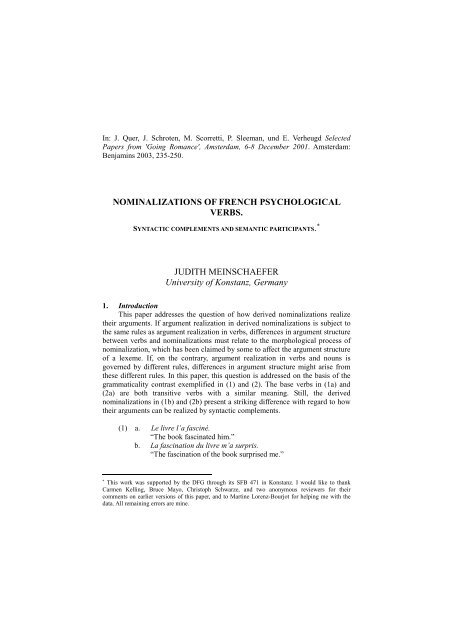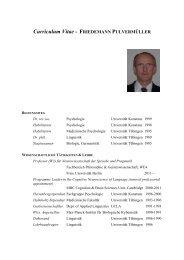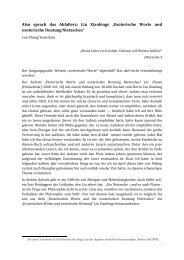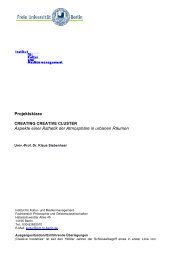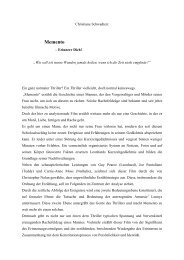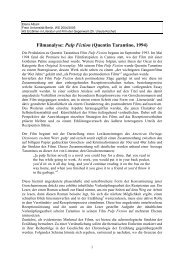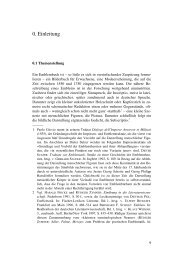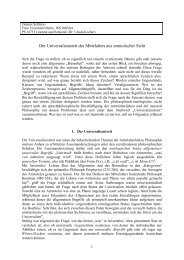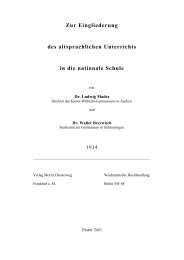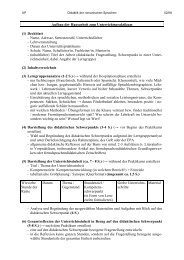nominalizations of french psychological verbs - Fachbereich ...
nominalizations of french psychological verbs - Fachbereich ...
nominalizations of french psychological verbs - Fachbereich ...
You also want an ePaper? Increase the reach of your titles
YUMPU automatically turns print PDFs into web optimized ePapers that Google loves.
In: J. Quer, J. Schroten, M. Scorretti, P. Sleeman, und E. Verheugd Selected<br />
Papers from 'Going Romance', Amsterdam, 6-8 December 2001. Amsterdam:<br />
Benjamins 2003, 235-250.<br />
NOMINALIZATIONS OF FRENCH PSYCHOLOGICAL<br />
VERBS.<br />
SYNTACTIC COMPLEMENTS AND SEMANTIC PARTICIPANTS. ∗<br />
JUDITH MEINSCHAEFER<br />
University <strong>of</strong> Konstanz, Germany<br />
1. Introduction<br />
This paper addresses the question <strong>of</strong> how derived <strong>nominalizations</strong> realize<br />
their arguments. If argument realization in derived <strong>nominalizations</strong> is subject to<br />
the same rules as argument realization in <strong>verbs</strong>, differences in argument structure<br />
between <strong>verbs</strong> and <strong>nominalizations</strong> must relate to the morphological process <strong>of</strong><br />
nominalization, which has been claimed by some to affect the argument structure<br />
<strong>of</strong> a lexeme. If, on the contrary, argument realization in <strong>verbs</strong> and nouns is<br />
governed by different rules, differences in argument structure might arise from<br />
these different rules. In this paper, this question is addressed on the basis <strong>of</strong> the<br />
grammaticality contrast exemplified in (1) and (2). The base <strong>verbs</strong> in (1a) and<br />
(2a) are both transitive <strong>verbs</strong> with a similar meaning. Still, the derived<br />
<strong>nominalizations</strong> in (1b) and (2b) present a striking difference with regard to how<br />
their arguments can be realized by syntactic complements.<br />
(1) a. Le livre l’a fasciné.<br />
“The book fascinated him.”<br />
b. La fascination du livre m’a surpris.<br />
“The fascination <strong>of</strong> the book surprised me.”<br />
∗ This work was supported by the DFG through its SFB 471 in Konstanz. I would like to thank<br />
Carmen Kelling, Bruce Mayo, Christoph Schwarze, and two anonymous reviewers for their<br />
comments on earlier versions <strong>of</strong> this paper, and to Martine Lorenz-Bourjot for helping me with the<br />
data. All remaining errors are mine.
236<br />
JUDITH MEINSCHAEFFER<br />
(2) a. La lettre l’a déçue.<br />
“The letter deceived her.”<br />
b. #La déception de la lettre m’a surpris.<br />
“The deception <strong>of</strong> the letter surprised me.”<br />
It is argued that the grammaticality contrast in (1) and (2) is correlated with<br />
a difference in the semantic structure <strong>of</strong> the underlying <strong>verbs</strong>. It is further argued<br />
that the contrast can be explained by assuming that the realization <strong>of</strong> arguments,<br />
or better, <strong>of</strong> semantic participants, <strong>of</strong> derived <strong>nominalizations</strong> can be projected<br />
from the underlying semantic form <strong>of</strong> the <strong>verbs</strong> involved, drawing on three<br />
realization rules for semantic participants <strong>of</strong> <strong>nominalizations</strong>. The discussion is<br />
restricted to <strong>psychological</strong> <strong>verbs</strong> and their derived <strong>nominalizations</strong>, because only<br />
within this semantic class we find <strong>verbs</strong> showing the same surface syntax and<br />
similar meaning, but presenting derived nouns contrasting crucially in how their<br />
semantic participants can be realized.<br />
The paper is structured as follows. Section 2 introduces some<br />
characteristics <strong>of</strong> <strong>psychological</strong> <strong>verbs</strong> and <strong>nominalizations</strong> in French. In section<br />
3, a number <strong>of</strong> descriptive generalizations about the realization <strong>of</strong> semantic<br />
participants in <strong>psychological</strong> <strong>nominalizations</strong> are presented. Section 4 explores<br />
the difference between classes <strong>of</strong> <strong>psychological</strong> <strong>verbs</strong>. In section 5, semantic<br />
representations for three classes <strong>of</strong> <strong>psychological</strong> <strong>verbs</strong> are introduced. In section<br />
6, I propose three participant-realization rules by means <strong>of</strong> which the descriptive<br />
generalizations stated in section 3 can be derived from the semantic<br />
representations given in section 5.<br />
2. Psychological <strong>verbs</strong> as a semantic class<br />
By <strong>psychological</strong> <strong>verbs</strong>, we mean <strong>verbs</strong> denoting an attitudinal or emotional<br />
relation between two entities, where the precise nature <strong>of</strong> this relation is part <strong>of</strong><br />
the lexical meaning <strong>of</strong> the verb. Examples are given in (3).<br />
(3) chagriner “grieve”, mépriser “scorn”, regretter “regret”, angoisser<br />
“afflict”, amuser “amuse”, étonner “astonish”, fasciner “fascinate”<br />
One constant property <strong>of</strong> <strong>psychological</strong> <strong>verbs</strong> appears to be that their semantic<br />
representation (on some level) includes an entity experiencing the attitudinal or<br />
emotional relation denoted by the verb; hence, these <strong>verbs</strong> are sometimes<br />
subsumed under the class <strong>of</strong> ‘experiencer <strong>verbs</strong>’. In the examples given in (4),<br />
the experiencing entity is realized as subject in (a), as direct object in (b), and as<br />
indirect object in (c).
237 NOMINALIZATIONS OF FRENCH PSYCHOLOGICAL VERBS<br />
(4) a. Lili adore sa petite sœur.<br />
“Lili adores her little sister.”<br />
b. Ce tableau l’a toujours fasciné.<br />
“This picture has always fascinated him.”<br />
c. Cette chanson ne plaît pas à Natalie.<br />
“This song does not please Natalie.”<br />
The thematic roles assigned to the arguments <strong>of</strong> <strong>psychological</strong> <strong>verbs</strong> are<br />
sometimes said to include the roles EXPERIENCER (<strong>of</strong> the attitudinal or emotional<br />
relation), THEME (what is experienced), or CAUSE or STIMULUS (<strong>of</strong> the<br />
experience). But it remains unclear whether the arguments <strong>of</strong> different classes <strong>of</strong><br />
<strong>psychological</strong> <strong>verbs</strong> are assigned the same thematic roles (as assumed, e.g., by<br />
Belletti & Rizzi 1988; Grimshaw 1990) or different thematic roles (e.g., Pesetsky<br />
1995; Iwata 1995;Wanner 2001), given that their syntactic realizations differ<br />
considerably, cf. (4a-c).<br />
Here, we assume that <strong>psychological</strong> <strong>verbs</strong> constitute a class <strong>of</strong> <strong>verbs</strong> sharing<br />
certain lexical and conceptual features, but not necessarily sharing the same<br />
thematic grid. Therefore, in the following we do not speak <strong>of</strong> arguments as<br />
bearing certain thematic roles. Instead, we assume that the semantic participants<br />
<strong>of</strong> <strong>psychological</strong> predicates are assigned two kinds <strong>of</strong> semantic or conceptual<br />
roles, that <strong>of</strong> ‘experiencing entity’ and that <strong>of</strong> ‘target or cause <strong>of</strong> the experience’.<br />
At this point in the discussion, we distinguish only two classes <strong>of</strong><br />
<strong>psychological</strong> <strong>verbs</strong>, on the basis <strong>of</strong> how the two semantic participants are<br />
realized syntactically: <strong>psychological</strong> <strong>verbs</strong> realizing the experiencing entity as<br />
subject are termed ‘experiencer-subject <strong>verbs</strong>’ or ES-<strong>verbs</strong>; <strong>psychological</strong> <strong>verbs</strong><br />
realizing the experiencing entity as direct object are termed ‘experiencer-object<br />
<strong>verbs</strong>’ or EO-<strong>verbs</strong>. Examples for both verb classes are given in (5a) and (5b),<br />
respectively.<br />
(5) a. ES-<strong>verbs</strong>: mépriser “scorn”, adorer “adore”, souhaiter “wish”<br />
b. EO-<strong>verbs</strong>: réconforter “comfort”, étonner “astonish”<br />
The next section addresses the question <strong>of</strong> how <strong>nominalizations</strong> derived from<br />
<strong>verbs</strong> <strong>of</strong> the two classes realize the semantic participants <strong>of</strong> the events they<br />
denote.<br />
3. Psychological nominals and their syntactic complements<br />
In French, <strong>nominalizations</strong> can be derived from <strong>verbs</strong> by means <strong>of</strong><br />
affixation <strong>of</strong> different nominalizing affixes, such as -ation or -ement, as<br />
exemplified in (6a) and (6b). In addition, <strong>nominalizations</strong> can be derived without
238<br />
JUDITH MEINSCHAEFFER<br />
affixation, as in (6c). Finally, we find non-derived <strong>psychological</strong> nominals, as in<br />
(6d).<br />
(6) a. admiration “admiration”, from admirer “admire”<br />
b. étonnement “astonishment”, from étonner “astonish”<br />
c. regret “regret”, from regretter “regret”<br />
d. intérêt “interest”, from Latin interest “it is important”<br />
A crucial difference between <strong>verbs</strong> and derived <strong>nominalizations</strong> is that for<br />
<strong>verbs</strong>, syntactic realization <strong>of</strong> semantic participants is obligatory, while for<br />
<strong>nominalizations</strong> (as well as for non-derived nominals) it is optional. Therefore, it<br />
is controversial whether the syntactic complements <strong>of</strong> <strong>nominalizations</strong><br />
corresponding to arguments <strong>of</strong> the base <strong>verbs</strong> should be termed arguments too, or<br />
whether they should rather be classified as adjuncts (e.g., Dowty 1989;<br />
Grimshaw 1990; Zucchi 1993:135; Alexiadou 2001:66). This question is not<br />
addressed here; when referring to phrases like de Max (‘de-phrase’) or pour sa<br />
faute (‘pour-phrase’), the term ‘complement’ is used. Likewise, we do not speak<br />
<strong>of</strong> arguments <strong>of</strong> lexemes as bearing thematic roles, but we do speak <strong>of</strong> semantic<br />
participants <strong>of</strong> events denoted by lexemes as bearing the semantic or conceptual<br />
roles ‘experiencing entity’ and ‘target or cause <strong>of</strong> the experience’. We then say<br />
that the complements <strong>of</strong> derived <strong>nominalizations</strong> realize the semantic<br />
participants <strong>of</strong> the event denoted by the nominalization, or that they refer to the<br />
semantic participants.<br />
In French, <strong>nominalizations</strong> derived from <strong>psychological</strong> <strong>verbs</strong> basically<br />
dispose <strong>of</strong> three types <strong>of</strong> syntactic constructions to realize semantic participants<br />
in the event denoted: prepositional phrases headed by de “<strong>of</strong>”, prepositional<br />
phrases headed by prepositions other than de, such as par “by” and pour “for”,<br />
and possessive determiners like son, sa “his, her, its”. The distribution <strong>of</strong><br />
possessive determiners is not discussed here (cf. Zubizarreta 1987:68).<br />
First, de-phrases can realize both the experiencing entity and the target or<br />
cause <strong>of</strong> the experience, (7b) and (7c). The sentence given in (7a) serves to<br />
disambiguate the conceptual roles <strong>of</strong> the two semantic participants.<br />
(7) a. Max regrette sa faute.<br />
“Max regrets his mistake.”<br />
b. le regret de Max<br />
“the regret <strong>of</strong> Max”<br />
c. le regret de la faute<br />
“the regret <strong>of</strong> the mistake”
239 NOMINALIZATIONS OF FRENCH PSYCHOLOGICAL VERBS<br />
As can be seen in (8), the same holds for non-derived <strong>psychological</strong> nominals<br />
like intérêt “interest”. Again, the sentence given in (8a) is intended to<br />
disambiguate the conceptual roles.<br />
(8) a. Nicolas s’intéresse aux détails.<br />
“Nicolas is interested in the details.”<br />
b. l’intérêt de Nicolas<br />
“the interest <strong>of</strong> Nicolas”<br />
c. l’intérêt des détails<br />
“the interest <strong>of</strong> the details”<br />
Second, par-phrases can occur only with EO-<strong>verbs</strong>, as in (9a, b), but not<br />
with ES-<strong>verbs</strong>, (9c). Where a par-phrase is grammatical, it refers to the target or<br />
cause <strong>of</strong> the experience; it cannot refer to the experiencing entity.<br />
(9) a. le recours à des techniques de fascination par l'image (Le<br />
Monde)<br />
“the recourse to techniques <strong>of</strong> fascination by images”<br />
b. la déception par le Gault Millau (WWW)<br />
“the deception by the Gault Millau”<br />
b. #l’admiration de cet auteur par Natalie<br />
“the admiration <strong>of</strong> this author by Natalie”<br />
With a number <strong>of</strong> <strong>nominalizations</strong> derived from EO-<strong>verbs</strong>, a par-phrase is<br />
considered ungrammatical by some speakers. Some derived <strong>psychological</strong><br />
<strong>nominalizations</strong>, however, do allow a par-phrase. Among those <strong>nominalizations</strong><br />
for which I have found corpus 1 examples with a par-phrase are affliction<br />
“affliction”, consolation “comfort”, déception “deception”, désappointement<br />
“disappointment”, fascination “fascination”, satisfaction “satisfaction”,<br />
stupéfaction “stupefaction”. Nominalizations derived without affixation, like<br />
réconfort “comfort”, as well as non-derived <strong>psychological</strong> nominals, like chagrin<br />
“grieve”, and deadjectival <strong>psychological</strong> <strong>nominalizations</strong>, like inquiétude<br />
“anxiety”, do not occur with par-phrases.<br />
Third, prepositional phrases headed by pour occur primarily with<br />
<strong>nominalizations</strong> derived from ES-<strong>verbs</strong>. Pour-phrases refer to the target or cause<br />
1 Using the database Frantext (http://zeus.inalf.cnrs.fr/frantext.htm), sequences <strong>of</strong> the type<br />
‘nominalization’ + par were searched in texts dating from 1900 to 2000. In addition, the relevant<br />
sequences were searched in the WWW, using the search engine Google (http://www.google.fr).
240<br />
JUDITH MEINSCHAEFFER<br />
<strong>of</strong> the experience, as in (10a), but not to the experiencing entity, (10b). With<br />
(most) EO-<strong>verbs</strong>, they can realize neither participant, (10c) and (10d). 2<br />
(10) a. l’admiration du lecteur pour ce livre<br />
“the admiration <strong>of</strong> the reader for this book”<br />
b. #l’admiration de ce livre pour le lecteur<br />
“the admiration <strong>of</strong> this book for the reader”<br />
c. #l’amusement des enfants pour ce jeu<br />
“the amusement <strong>of</strong> the children for this play”<br />
d. #l’amusement de ce jeu pour les enfants<br />
“the amusement <strong>of</strong> this play for the children”<br />
Pour-phrases are also found with non-deverbal <strong>psychological</strong> nominals; they<br />
likewise refer to the target or cause <strong>of</strong> the experience, but not to the experiencing<br />
entity, see (11).<br />
(11) a. Nicolas s’intéresse aux détails.<br />
“Nicolas is interested in the details.”<br />
b. #l’intérêt pour Nicolas<br />
“the interest for Nicolas”<br />
c. l’intérêt pour les détails<br />
“the interest for the details”<br />
Interestingly, de-phrases do not show the same distribution with respect to<br />
all classes <strong>of</strong> <strong>psychological</strong> <strong>nominalizations</strong>, as exemplified by (1) and (2) above.<br />
De-phrase complements <strong>of</strong> ES-<strong>nominalizations</strong> can realize either the experiencing<br />
entity, as in (7b) above, or the target or cause <strong>of</strong> the experience, (7c) above. The<br />
same is true for de-phrase complements <strong>of</strong> some EO-<strong>nominalizations</strong>, like<br />
fascination. In (12b), the de-phrase refers to the experiencing entity; in (12c), it<br />
refers to the target or cause <strong>of</strong> the experience.<br />
(12) a. L’orateur a fasciné l’auditoire.<br />
“The speaker fascinated the audience.”<br />
b. La fascination de l’auditoire était facile.<br />
“The fascination <strong>of</strong> the audience was easy.”<br />
c. La fascination de l’orateur m’a surpris.<br />
“The fascination <strong>of</strong> the speaker surprised me.”<br />
2 Still, one does find phrases like la fascination de ce livre pour les lecteurs contemporains “the<br />
fascination <strong>of</strong> this book for contemporary readers”. Examples <strong>of</strong> this type are discussed in section 6.
241 NOMINALIZATIONS OF FRENCH PSYCHOLOGICAL VERBS<br />
Other EO-<strong>verbs</strong>, however, like déception, do not allow de-phrases to refer to the<br />
target or cause <strong>of</strong> the experience, (13c); rather, they permit only de-phrases that<br />
refer to the experiencing entity, as in (13b). 3<br />
(13) a. La réalité a déçu la jeune fille.<br />
“Reality deceived the young girl.”<br />
b. La déception de la jeune fille survint quand elle avait seize ans.<br />
“The deception <strong>of</strong> the young girl supervened when she was<br />
sixteen.”<br />
c. #La déception de la réalité m’a surpris.<br />
“The deception <strong>of</strong> reality surprised me.”<br />
I have not found any underived <strong>psychological</strong> nouns sharing the properties <strong>of</strong><br />
derived <strong>nominalizations</strong> like déception. Still, some deadjectival <strong>nominalizations</strong><br />
do present the same type <strong>of</strong> argument realization. Thus, the deadjectival noun<br />
inquiétude “anxiety” occurs with a de-phrase realizing the experiencing entity,<br />
(14b), but it cannot occur with a de-phrase referring to the target or cause <strong>of</strong> the<br />
experience, (14c).<br />
(14) a. Ses paroles ont inquiété l’enfant.<br />
“His words troubled the child.”<br />
b. L’inquiétude de l’enfant (à propos de ses paroles) était évidente.<br />
“The anxiety <strong>of</strong> the child (about his words) was evident.”<br />
c. #L’inquiétude de ses paroles m’a surpris.<br />
“The anxiety <strong>of</strong> his words surprised me.”<br />
It is interesting to note that déception-<strong>nominalizations</strong> behave like<br />
<strong>nominalizations</strong> derived from canonical transitive <strong>verbs</strong> like destruction, in that<br />
they show an effect <strong>of</strong> ‘suppression’ <strong>of</strong> the argument which is realized as subject<br />
<strong>of</strong> the underlying verb (Grimshaw 1990:107), as exemplified in (15).<br />
3 Corpus analyses have shown that one does find examples like (27a, b) below, where the de-phrase<br />
refers to a participant which might at first glance appear to be like a target or cause <strong>of</strong> the experience.<br />
In such expressions, however, déception de x “deception <strong>of</strong> x” has rather the meaning <strong>of</strong> x est une<br />
déception “x is a deception” or x est ce qui déçoit “x is what deceives” than the meaning <strong>of</strong> x a déçu<br />
“x has deceived”. While these cases certainly merit a closer analysis, they are clearly distinct from<br />
the examples studied in this paper.<br />
(27) a. ce roman m’exposait [...] à toutes les déceptions du réel (Yourcenar, 1931, Frantext)<br />
“this novel exposed me [...] to all the deceptions <strong>of</strong> the real”<br />
b. La déception de mon corps, j’en prenais mon parti. (Beauvoir, 1954, Frantext)<br />
“The deception <strong>of</strong> my body, I came to terms with it.”
242<br />
JUDITH MEINSCHAEFFER<br />
(15) a. the destruction <strong>of</strong> the city (by the enemy)<br />
a’. la destruction de la ville (par l’armée)<br />
b. the enemy’s destruction <strong>of</strong> the city<br />
c. #the destruction <strong>of</strong> the enemy [if enemy ~ subject <strong>of</strong> destroy]<br />
c’ #la destruction de l’armée [if armée ~ subject <strong>of</strong> détruire]<br />
This effect <strong>of</strong> ‘argument suppression’ has led some researchers to describe<br />
nominalization as an operation similar to passive formation (Grimshaw 1990), or<br />
to conceive <strong>of</strong> <strong>nominalizations</strong> as ergative constructions (Williams 1987;<br />
Alexiadou 2001). For the <strong>psychological</strong> <strong>nominalizations</strong> investigated here, we<br />
find a minimal contrast in grammaticality, with one class <strong>of</strong> <strong>verbs</strong> allowing<br />
realization <strong>of</strong> both participants in a de-phrase, and with the other class showing<br />
‘argument suppression’ (Grimshaw 1990). At the same time, the underlying<br />
<strong>verbs</strong> present no differences in surface syntax, with both classes realizing the<br />
experiencing entity as the direct object. In the following, we propose to show<br />
that this contrast in grammaticality can be related to semantic differences <strong>of</strong> the<br />
underlying <strong>verbs</strong>. To this aim, in the next section we propose that two classes <strong>of</strong><br />
EO-<strong>verbs</strong> can be distinguished in French on the basis <strong>of</strong> aspectual criteria.<br />
4. Aspectual features <strong>of</strong> <strong>psychological</strong> <strong>verbs</strong><br />
The two classes <strong>of</strong> EO-<strong>verbs</strong> distinguished in the previous section present<br />
differences with respect to their compatibility with aspectual adverbials (cf.<br />
Voorst 1992 for a more comprehensive account). Fasciner-<strong>verbs</strong> are compatible<br />
with ad<strong>verbs</strong> <strong>of</strong> duration like pendant longtemps “for a long time“, as in (16a),<br />
but they are less felicitous with adverbial expressions implying the existence <strong>of</strong> a<br />
target state, like en peu de temps “in little time“, see (16b). Décevoir-<strong>verbs</strong> show<br />
the opposite distribution; they are not felicitous with ad<strong>verbs</strong> <strong>of</strong> duration, (16c),<br />
but they are compatible with target state oriented expressions, (16d).<br />
(16) a. Le livre l’a fasciné pendant longtemps.<br />
“The book fascinated him for a long time.”<br />
b. #Le livre l’a fasciné en peu de temps.<br />
“The book fascinated him in little time.”<br />
c. #Le livre l’a déçu pendant longtemps.<br />
“The book deceived him for a long time.”<br />
d. Le livre l’a déçu en peu de temps.<br />
“The book deceived him in little time.”<br />
As can be seen from their distribution relative to adverbial expressions, fasciner<strong>verbs</strong><br />
are not telic, i.e., they do not imply a target state, while décevoir-<strong>verbs</strong> are
243 NOMINALIZATIONS OF FRENCH PSYCHOLOGICAL VERBS<br />
telic, i.e. they do imply a target state (cf. Vendler 1967; Dowty 1979; Smith<br />
1997). Hence, the syntactic difference between the two classes <strong>of</strong> EO-<strong>verbs</strong> is<br />
correlated with an aspectual difference.<br />
In fact, there are even aspectual differences between the ES and EO classes:<br />
ES-<strong>verbs</strong> are stative, while EO-<strong>verbs</strong> are non-stative. That ES-<strong>verbs</strong> are stative,<br />
can be inferred from their incompatibility with progressive constructions, e.g.,<br />
with the French paraphrase être en train de (Borillo 1988; Smith 1997), cf. (17).<br />
(17) #Max est en train de regretter sa faute.<br />
“Max is regretting his mistake.”<br />
EO-<strong>verbs</strong>, in contrast, are non-stative, since they are compatible with progressive<br />
operators (unless they are telic and punctual, like décevoir), as in (18).<br />
(18) a. L’acteur est en train de fasciner le public.<br />
“The actor is fascinating the audience.”<br />
b. Le clown est en train d’amuser les enfants.<br />
“The clown is amusing the children.”<br />
Hence, we distinguish three aspectual classes <strong>of</strong> <strong>psychological</strong> <strong>verbs</strong> in<br />
French. First, ES-<strong>verbs</strong> are stative. Besides regretter, <strong>verbs</strong> like admirer<br />
“admire”, estimer “estimate” belong to this class. Second, some EO-<strong>verbs</strong>, i.e.,<br />
fasciner-<strong>verbs</strong>, are non-stative and atelic. With derived <strong>nominalizations</strong>, both<br />
semantic participants can be realized in a de-phrase. Besides fasciner, <strong>verbs</strong> like<br />
dégoûter “disgust”, humilier “humiliate”, tracasser “worry” belong to this class.<br />
Verbs <strong>of</strong> this class denote <strong>psychological</strong> processes where the attitude or emotion<br />
can be ascribed to the experiencing entity only in the presence <strong>of</strong> the target or<br />
cause <strong>of</strong> the experience. Third, other EO-<strong>verbs</strong>, i.e., décevoir-<strong>verbs</strong>, are nonstative<br />
and telic. With derived <strong>nominalizations</strong>, only one <strong>of</strong> the semantic<br />
participants can be realized in a de-phrase. Besides décevoir, many deadjectival<br />
<strong>psychological</strong> <strong>verbs</strong>, e.g. attrister “sadden”, contenter “content”, as well as many<br />
punctual <strong>psychological</strong> <strong>verbs</strong>, e.g. étonner “astonish”, émerveiller “amaze”,<br />
surprendre “surprise” belong to this class. Verbs <strong>of</strong> this class denote<br />
<strong>psychological</strong> events where the attitude or emotion can be ascribed to the<br />
experiencing entity not only in the presence, but also in the absence <strong>of</strong> the target<br />
or cause <strong>of</strong> the experience. Finally, note that we find in French non-derived<br />
<strong>psychological</strong> nouns whose participant-realizing properties correspond to<br />
<strong>nominalizations</strong> derived from regretter-<strong>verbs</strong> and to fasciner-<strong>verbs</strong>, while we<br />
find only deadjectival <strong>psychological</strong> <strong>nominalizations</strong> sharing the participantrealizing<br />
properties <strong>of</strong> <strong>nominalizations</strong> derived from décevoir-<strong>verbs</strong>. The next<br />
section proposes semantic representations for the three classes <strong>of</strong> <strong>psychological</strong>
244<br />
JUDITH MEINSCHAEFFER<br />
<strong>verbs</strong>. In section 6, it is shown that, drawing on three additional realization rules,<br />
the correct distribution <strong>of</strong> the different types <strong>of</strong> complements to <strong>psychological</strong><br />
<strong>nominalizations</strong> can be derived from the semantic representations proposed for<br />
the <strong>verbs</strong>.<br />
5. Semantic representations for <strong>psychological</strong> <strong>verbs</strong><br />
It is a commonly held assumption in lexical semantics that the meaning <strong>of</strong> a<br />
lexeme can be decomposed into atomic predicates. One <strong>of</strong> the basic claims <strong>of</strong><br />
such an approach is that <strong>verbs</strong> sharing certain atomic predicates also share some<br />
<strong>of</strong> their grammatical properties. Hence, the decompositional semantic<br />
representation <strong>of</strong> a lexeme is claimed to encode not only the meaning, but also<br />
some <strong>of</strong> the grammatical properties <strong>of</strong> this lexeme. Within a decompositional<br />
framework, the analysis presented here aims at deriving the argument-realizing<br />
properties <strong>of</strong> three different classes <strong>of</strong> <strong>psychological</strong> <strong>nominalizations</strong> from the<br />
meaning <strong>of</strong> the underlying <strong>verbs</strong>. To this end, I propose that the meanings <strong>of</strong> the<br />
three verb classes from which the <strong>nominalizations</strong> are derived can be represented<br />
as in (19).<br />
(19) a. regretter PSYCH_RELATION (x, y)<br />
b. fasciner CAUSE (ACT (y), PSYCH_RELATION (x, y))<br />
c. étonner CAUSE (ACT (y), CHANGE (PSYCH_STATE (x))) 4<br />
The decompositional representations are intended to be interpreted in terms<br />
<strong>of</strong> the paraphrases given in (20).<br />
(20) a. “If x regrets y, then x stands in a <strong>psychological</strong> relation to y.”<br />
b. “If y fascinates x, then some action <strong>of</strong> y causes x to stand in a<br />
<strong>psychological</strong> relation to y.”<br />
c. “If y astonishes x, then some action <strong>of</strong> y causes x to come to be<br />
in a <strong>psychological</strong> state.”<br />
Note that, since we are interested here in expressing generalizations concerning<br />
the relation between semantic participants and syntactic complements, but not in<br />
properties <strong>of</strong> individual lexical items, the representations in (19) consist entirely<br />
<strong>of</strong> highly general atomic predicates like CAUSE, ACT, PSYCH_STATE, termed ‘base<br />
predicates’, abstracting away from semantic differences which do not appear to<br />
be reflected in the syntactic realization <strong>of</strong> semantic participants.<br />
4 For this class <strong>of</strong> <strong>psychological</strong> <strong>verbs</strong>, similar representations have been proposed by Wanner (2001)<br />
and Iwata (1995). The assumption that EO-<strong>verbs</strong> are causative is also made in some syntactic<br />
accounts <strong>of</strong> <strong>psychological</strong> <strong>verbs</strong> (e.g., Pesetsky 1995).
245 NOMINALIZATIONS OF FRENCH PSYCHOLOGICAL VERBS<br />
The base predicates in (19) are intended as representations <strong>of</strong> how the<br />
arguments <strong>of</strong> a lexeme participate in the event denoted by the lexeme. In other<br />
words, the conceptual roles assigned to the semantic participants <strong>of</strong> the event<br />
denoted by the lexeme can be inferred from the base predicates (cf. Jackend<strong>of</strong>f<br />
1987). More precisely, it is assumed here that the first participant <strong>of</strong> a<br />
<strong>psychological</strong> relation (PSYCH_RELATION) is an experiencing entity, and the<br />
second participant <strong>of</strong> a <strong>psychological</strong> relation is the target <strong>of</strong> the experience; cf.<br />
(21a). Likewise, the (single) participant <strong>of</strong> a <strong>psychological</strong> state (PSYCH_STATE)<br />
is an experiencing entity; cf. (21b). The (single) participant <strong>of</strong> an action (ACT) is<br />
an agent; cf. (21c).<br />
Note that at this point, we can dissociate the roles ‘target <strong>of</strong> the experience’<br />
and ‘cause <strong>of</strong> the experience’, which have been conflated throughout the<br />
previous paragraphs as ‘target or cause <strong>of</strong> the experience’. By ‘cause <strong>of</strong> the<br />
experience’, we denote the participant which is introduced as an argument <strong>of</strong> the<br />
predicate standing in a causal relation to a a <strong>psychological</strong> state or relation, cf.<br />
(21d).<br />
(21) a. PSYCH_RELATION (experiencing entity, target <strong>of</strong> the experience)<br />
b. PSYCH_STATE (experiencing entity)<br />
c. ACT (agent)<br />
d. ‘cause <strong>of</strong> the experience’: participant causing a <strong>psychological</strong><br />
state or relation<br />
Finally, we assume by convention that <strong>psychological</strong> relations (represented<br />
by PSYCH_RELATION) and <strong>psychological</strong> states (represented by PSYCH_STATE) are<br />
states, i.e., they are stative; actions (represented by ACT) are processes, i.e., they<br />
are non-stative and atelic; changes <strong>of</strong> state (represented by CHANGE<br />
(PSYCH_STATE)) are events, i.e., they are non-stative and telic (cf. Mourelatos<br />
1978; Smith 1997). Let us further stipulate that in the case <strong>of</strong> complex<br />
predications, only the aspectual type <strong>of</strong> the aspectually highest predicate is<br />
projected onto the complex predication, where the hierarchy is<br />
‘event > process > state’ (cf. Ehrich & Rapp 2000), with ‘>’ meaning “is<br />
aspectually higher than”. Under this assumption, <strong>verbs</strong> with a semantic structure<br />
as in (19a), i.e., ES-<strong>verbs</strong>, denote states. Verbs with a semantic structure as in<br />
(19b), i.e., EO-fasciner-<strong>verbs</strong>, denote processes, and <strong>verbs</strong> with a semantic<br />
structure as in (19c), i.e., EO-décevoir-<strong>verbs</strong>, denote events.<br />
To conclude, the representations given in (19) for the three different classes<br />
<strong>of</strong> <strong>verbs</strong> encode the aspectual type <strong>of</strong> the denoted event as well as the conceptual<br />
roles assigned to the participants <strong>of</strong> the denoted event. In the next section, we<br />
will see that, drawing on three additional participant-realization rules, we can
246<br />
JUDITH MEINSCHAEFFER<br />
derive the syntactic realization <strong>of</strong> the semantic participants for the derived<br />
<strong>nominalizations</strong> from the representations in (19).<br />
6. Participant-realization rules for <strong>psychological</strong> <strong>nominalizations</strong><br />
Section 3 above described which types <strong>of</strong> prepositional phrases (de-phrase,<br />
pour-phrase, par-phrase) occur with which class <strong>of</strong> <strong>psychological</strong><br />
<strong>nominalizations</strong> (derived from ES-<strong>verbs</strong> and two types <strong>of</strong> EO-<strong>verbs</strong>), and to<br />
which semantic participants (experiencing entity, target or cause <strong>of</strong> the<br />
experience) these can refer. The present section aims at formulating three<br />
participant-realization rules by means <strong>of</strong> which the descriptive generalizations<br />
stated in section 3 can be derived from the semantic representations given in<br />
section 5. In particular, we want to derive the differing behavior <strong>of</strong> EO-<strong>verbs</strong> <strong>of</strong><br />
the fasciner-type and <strong>of</strong> EO-<strong>verbs</strong> <strong>of</strong> the décevoir-type with regard to which<br />
semantic participant can be realized in a de-phrase. For convenience, the<br />
semantic representations <strong>of</strong> the <strong>verbs</strong> are repeated in (22).<br />
(22) a. ES regretter PSYCH_RELATION (x, y)<br />
b. EO fasciner CAUSE (ACT (y), PSYCH_RELATION (x, y))<br />
c. EO décevoir CAUSE (ACT (y), CHANGE (PSYCH_STATE (x)))<br />
As to the de-phrase, regret-<strong>nominalizations</strong>, as well as fascination<strong>nominalizations</strong>,<br />
can realize both participants; experiencing entity and target <strong>of</strong><br />
the experience. Déception-<strong>nominalizations</strong>, in contrast, can realize only the<br />
experiencing entity, i.e., the participant over which the resulting <strong>psychological</strong><br />
state is predicated.<br />
According to the semantic representations proposed here, the semantic<br />
forms <strong>of</strong> fasciner-<strong>verbs</strong> and décevoir-<strong>verbs</strong> have identical first elements; the<br />
structure <strong>of</strong> the first element should therefore play no role. Furthermore,<br />
regretter-<strong>verbs</strong> and fasciner-<strong>verbs</strong> (which behave alike) have identical second<br />
elements, while fasciner-<strong>verbs</strong> and décevoir-<strong>verbs</strong> (which show the contrast)<br />
differ with regard to the second element <strong>of</strong> the predication. Hence, the relevant<br />
difference should reside in the second element <strong>of</strong> the complex predications. More<br />
precisely, for fasciner-<strong>verbs</strong> (as well as for regretter-<strong>verbs</strong>), the second element<br />
contains two arguments, while for décevoir-<strong>verbs</strong>, the second element contains<br />
but a single argument. In other words, for <strong>verbs</strong> <strong>of</strong> the fasciner-type, the state<br />
which is caused is transitive, i.e., it is a <strong>psychological</strong> relation, while for <strong>verbs</strong> <strong>of</strong><br />
the décevoir-type, it is intransitive, i.e., it is a <strong>psychological</strong> state. The<br />
generalization which can be drawn is then that the semantic participants which<br />
can be realized by the de-phrase are those which appear in the second, or
247 NOMINALIZATIONS OF FRENCH PSYCHOLOGICAL VERBS<br />
rightmost, element <strong>of</strong> the complex predication. If this element is transitive, both<br />
arguments can be realized in a de-phrase; if it is intransitive, only one argument<br />
can be realized in a de-phrase. Hence, if the interpretation <strong>of</strong> de-phrase<br />
complements <strong>of</strong> deverbal <strong>nominalizations</strong> is sensitive to which participants<br />
appear as arguments <strong>of</strong> the second, or rightmost, element, the difference between<br />
EO-<strong>nominalizations</strong> <strong>of</strong> the fascination-type and those <strong>of</strong> the déception-type<br />
receives a straightforward interpretation. We therefore propose that the rule in<br />
(23) regulates how semantic participants are realized by de-phrase complements<br />
<strong>of</strong> <strong>nominalizations</strong>.<br />
(23) Rule 1: De-phrases can refer to the semantic participants introduced<br />
by the rightmost predicate in the semantic form.<br />
Note that this is a ‘positive’ formulation (cf. Markantonatou 1995 for a similar<br />
proposal) <strong>of</strong> a previously made ‘negative’ generalization about <strong>nominalizations</strong><br />
<strong>of</strong> the destruction-type, cf. (15) above. This generalization has previously been<br />
referred to as ‘suppression’ <strong>of</strong> the external argument (i.e., <strong>of</strong> the agent or causer),<br />
(Grimshaw 1990; Alexiadou 2001), and it has also been termed ‘causer deletion’<br />
(Iwata 1995). Hence, previous approaches have argued that the agent or causer,<br />
i.e., the semantic participant <strong>of</strong> the leftmost predicate, cannot be realized by <strong>of</strong>phrases<br />
in English, corresponding to French de-phrases, because it is suppressed<br />
or deleted from the argument structure. The present proposal, in contrast, argues<br />
that a semantic participant which has the conceptual role <strong>of</strong> agent or causer can<br />
be realized in a de-phrase in French, but only if it has, in addition, a role to play<br />
in the rightmost predicate. Thus, the argument ‘suppression’ effect found for<br />
destruction-<strong>nominalizations</strong> and déception-<strong>nominalizations</strong>, but not for<br />
fascination-<strong>nominalizations</strong>, is claimed to arise from the participant-realization<br />
rule in (23).<br />
The second generalization drawn in section 2 stated that prepositional<br />
phrases headed by par can be interpreted only as referring to semantic<br />
participants <strong>of</strong> events denoted by EO-<strong>verbs</strong>. In addition, it was said that a parphrase<br />
can refer only to what was termed the target or cause <strong>of</strong> the experience,<br />
but not to the experiencing entity. Looking at the semantic representations in<br />
(22), we see that EO-<strong>verbs</strong>, i.e., fasciner-<strong>verbs</strong> and décevoir-<strong>verbs</strong>, share their<br />
leftmost element, i.e., ACT, the presence or absence <strong>of</strong> which furthermore<br />
distinguishes EO-<strong>verbs</strong> from ES-<strong>verbs</strong>. Therefore, we assume that it is the<br />
semantic participant introduced by ACT, i.e., the agent, which can be realized in a<br />
par-phrase. This generalization is formulated in (24).<br />
(24) Rule 2 : Par-phrases can refer to the semantic participant introduced<br />
by ACT, i.e., to the agent.
248<br />
JUDITH MEINSCHAEFFER<br />
Finally, prepositional phrases headed by pour were said to occur only with<br />
ES-<strong>nominalizations</strong>, but not with EO- <strong>nominalizations</strong>; they can refer to the target<br />
<strong>of</strong> the experience, but not to the experiencing entity. This observation, however,<br />
immediately raises the question why for EO- <strong>nominalizations</strong> the target <strong>of</strong> the<br />
experience cannot be realized in a pour-phrase. What is then the relevant<br />
difference between ES-<strong>verbs</strong> and EO-<strong>verbs</strong> <strong>of</strong> the fasciner-type? One difference<br />
consists in the aspectual type <strong>of</strong> the <strong>verbs</strong>: ES-<strong>verbs</strong> are stative, while EOfasciner-<strong>verbs</strong><br />
are non-stative.<br />
Evidence that stativity is indeed a factor governing the distribution <strong>of</strong> pourphrases<br />
can be gained from the examples in (25), showing that pour-phrases are<br />
grammatical with <strong>nominalizations</strong> <strong>of</strong> the fascination-type, but only under certain<br />
circumstances.<br />
(25) a. la fascination progressive de ce livre / par ce livre<br />
“the growing fascination <strong>of</strong> this book / by this book”<br />
b. l’énorme fascination de ce livre / #par ce livre<br />
“the enormous fascination <strong>of</strong> this book / by this book”<br />
c. une énorme fascination pour ce livre<br />
“an enormous fascination for this book”<br />
As shown by (25a), fascination is a process nominalization (as demonstrated by<br />
the adjective progressif “growing”); it is compatible with a de-phrase or parphrase.<br />
(25b) shows that fascination can have a second interpretation: it can<br />
occur with the degree-modifying adjective énorme “enormous”, which we<br />
assume to modify (stative) qualities, but not (non-stative) processes. Thus, when<br />
fascination has a stative interpretation, as in (25b), the de-phrase is still possible,<br />
but the par-phrase appears to be less felicitous. Importantly, with a stative<br />
interpretation, fascination is compatible also with a pour-phrase, as in (25c). We<br />
therefore propose that the rule in (26) regulates the interpretation <strong>of</strong> pourphrases.<br />
(26) Rule 3: Pour-phrases can refer to the second semantic participant<br />
introduced by PSYCH_RELATION, i.e., to the target <strong>of</strong> experience, <strong>of</strong><br />
stative predicates.<br />
To conclude, this section has shown that the distribution and interpretation<br />
<strong>of</strong> syntactic complements <strong>of</strong> <strong>psychological</strong> <strong>nominalizations</strong> can be derived from<br />
the semantic representations introduced in section 5, by drawing on three<br />
additional rules governing the realization <strong>of</strong> semantic participants by three types<br />
<strong>of</strong> syntactic complements. The lexical representations and the participant-
249 NOMINALIZATIONS OF FRENCH PSYCHOLOGICAL VERBS<br />
realization rules proposed can thus not only account for the grammaticality<br />
contrast exemplified in (1) and (2), but also for the distribution <strong>of</strong> par-phrases<br />
and pour-phrases with <strong>nominalizations</strong> derived from <strong>psychological</strong> <strong>verbs</strong>.<br />
7. Conclusion<br />
The paper started with the question how derived <strong>nominalizations</strong> realize<br />
their semantic participants by means <strong>of</strong> syntactic complements. The discussion<br />
has shown that, given appropriate semantic representations <strong>of</strong> the base <strong>verbs</strong><br />
from which information about conceptual roles <strong>of</strong> semantic participants can be<br />
gained, the syntactic realization can be derived with three realization rules. A<br />
central concern was to explain the grammaticality contrast found for two<br />
different classes <strong>of</strong> derived <strong>nominalizations</strong> with regard to de-phrase<br />
complements. It was shown that the contrast can be related to the semantic<br />
structure <strong>of</strong> the underlying <strong>verbs</strong>, assuming that only certain substructures <strong>of</strong> a<br />
complex predication are accessible for participant realization in de-phrases.<br />
Here, it would be worthwhile participant realization in <strong>verbs</strong>. As to the other two<br />
types <strong>of</strong> syntactic complements discussed, par-phrases and pour-phrases, it was<br />
argued that they are subject to realization rules sensitive to particular conceptual<br />
roles <strong>of</strong> participants and aspectual features <strong>of</strong> the underlying <strong>verbs</strong>. It would be<br />
interesting to see whether these rules can be related to a more general account <strong>of</strong><br />
the semantics <strong>of</strong> the prepositions par and pour. In sum, the discussion has shown<br />
that participant realization in <strong>nominalizations</strong> is governed by rules different from<br />
those regulating participant realization in <strong>verbs</strong>. This assumption receives further<br />
support from the observation that non-derived <strong>psychological</strong> nominals as well as<br />
deadjectival <strong>psychological</strong> <strong>nominalizations</strong> realize participants in a similar way<br />
as deverbal <strong>nominalizations</strong>.<br />
References<br />
Alexiadou, Artemis. 2001. Functional Structure in Nominals. Nominalization and<br />
Ergativity. Amsterdam & Philadelphia: John Benjamins.<br />
Belletti, Adriana & Luigi Rizzi. 1988. “Psych-Verbs and θ–Theory”. Natural Language<br />
and Linguistic Theory 6.297-352.<br />
Borillo, Andrée. 1988. “L’expression de la durée : Construction des noms et des verbes de<br />
mesure temporelle”. Lingvisticae Investigationes 12.363-396.<br />
Dowty, David R. 1979. Word Meaning and Montague Grammar. Dordrecht: Reidel.<br />
----------. 1989. “On the Semantic Content <strong>of</strong> the Notion ‘Thematic Role’”. Properties,<br />
Types and Meanings ed. by Gennaro Chierchia, Barbara H. Partee & Raymond<br />
Turner, 69-129. Dordrecht: Kluwer.<br />
Ehrich, Veronika & Irene Rapp. 2000. “Sortale Bedeutung und Argumentstruktur: ung-<br />
Nominalisierungen im Deutschen”. Zeitschrift für Sprachwissenschaft 19:2.245-<br />
303.
250<br />
JUDITH MEINSCHAEFFER<br />
Frantext. http://zeus.inalf.cnrs.fr/frantext.htm<br />
Grimshaw, Jane. 1990. Argument Structure. Cambridge, Mass.: MIT Press.<br />
Iwata, Seizi. 1995. “The Distinctive Character <strong>of</strong> Psych-Verbs as Causatives”. Linguistic<br />
Analysis 129.95-120.<br />
Jackend<strong>of</strong>f, Ray. 1987. “The Status <strong>of</strong> Thematic Relations in Linguistic Theory”.<br />
Linguistic Inquiry 18.369-411.<br />
Markantonatou, Stella. 1995. “Modern Greek Deverbal Nominals: An LMT Approach”.<br />
Journal <strong>of</strong> Linguistics 31.267-299.<br />
Mourelatos, Alexander P. 1978. “Events, Processes and States”. Linguistics and<br />
Philosophy 2.415-434.<br />
Pesetsky, David. 1995. Zero Syntax. Experiencers and Cascades. Cambridge, Mass. &<br />
London: MIT Press.<br />
Smith, Carlota S. 1997. The Parameter <strong>of</strong> Aspect. Second edition. Dordrecht: Kluwer.<br />
Vendler, Zeno. 1967. Linguistics in Philosophy. Ithaca, N.Y.: Cornell University Press.<br />
Voorst, Jan van. 1992. “The Aspectual Semantics <strong>of</strong> Psychological Verbs”. Linguistics &<br />
Philosophy 15:1.65-92.<br />
Wanner, Anja. 2001. “The Optimal Linking <strong>of</strong> Arguments: The Case <strong>of</strong> English<br />
Psychological Verbs”. Competition in Syntax ed. by Gereon Müller & Wolfgang<br />
Sternefeld, 377- 399. Berlin: Mouton de Gruyter.<br />
Williams, Edwin. 1987. “English as an Ergative Language: The Theta Structure <strong>of</strong><br />
Derived Nouns”. Papers from the 23 rd Annual Regional Meeting <strong>of</strong> Chicago<br />
Linguistics Society 23:1.366-375.<br />
Zubizarreta, Maria Luisa. 1987. Levels <strong>of</strong> Representations in the Lexicon and in the<br />
Syntax. Dordrecht: Foris.<br />
Zucchi, Alessandro. 1993. The Language <strong>of</strong> Propositions and Events. Dordrecht: Kluwer.


